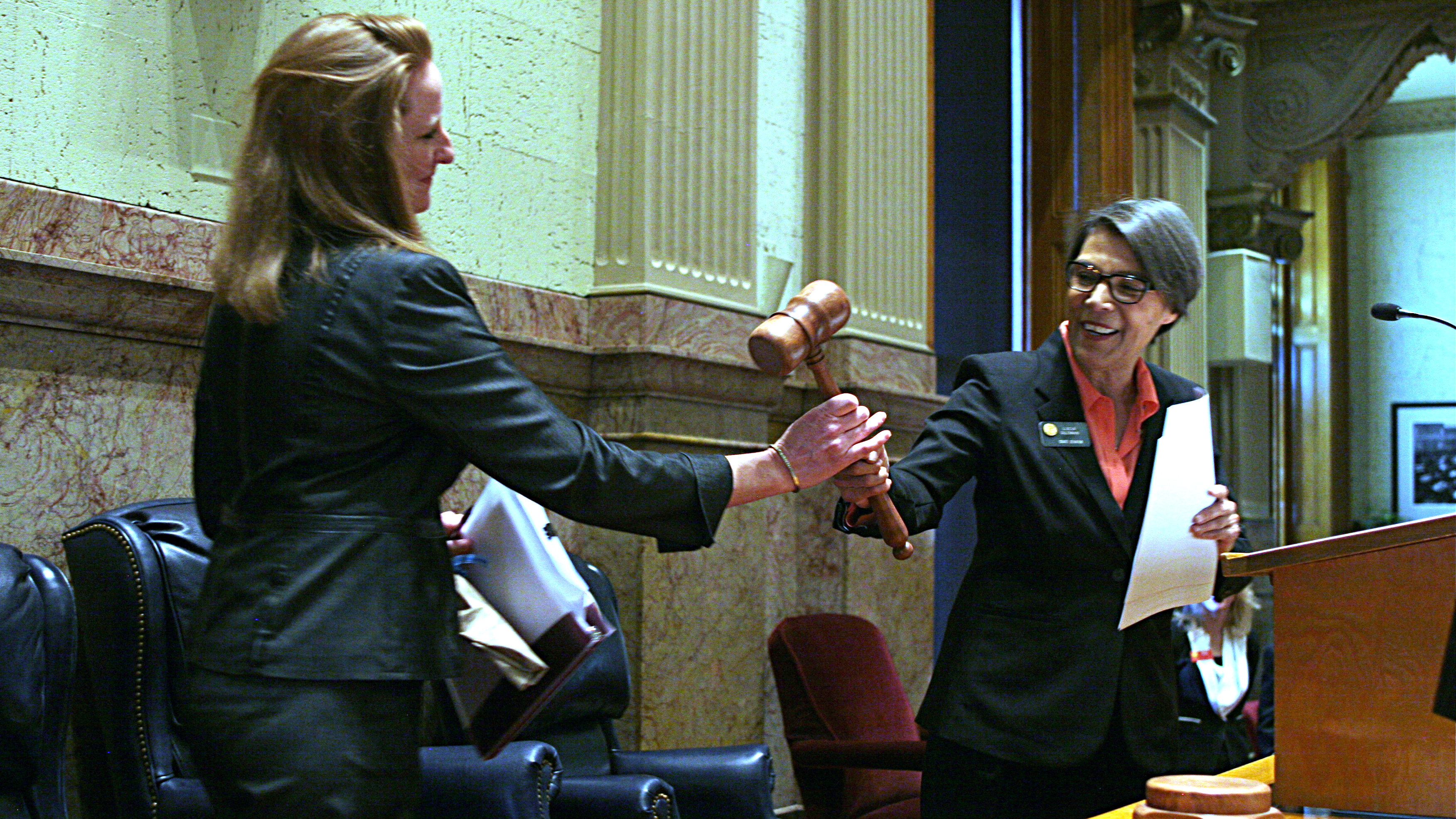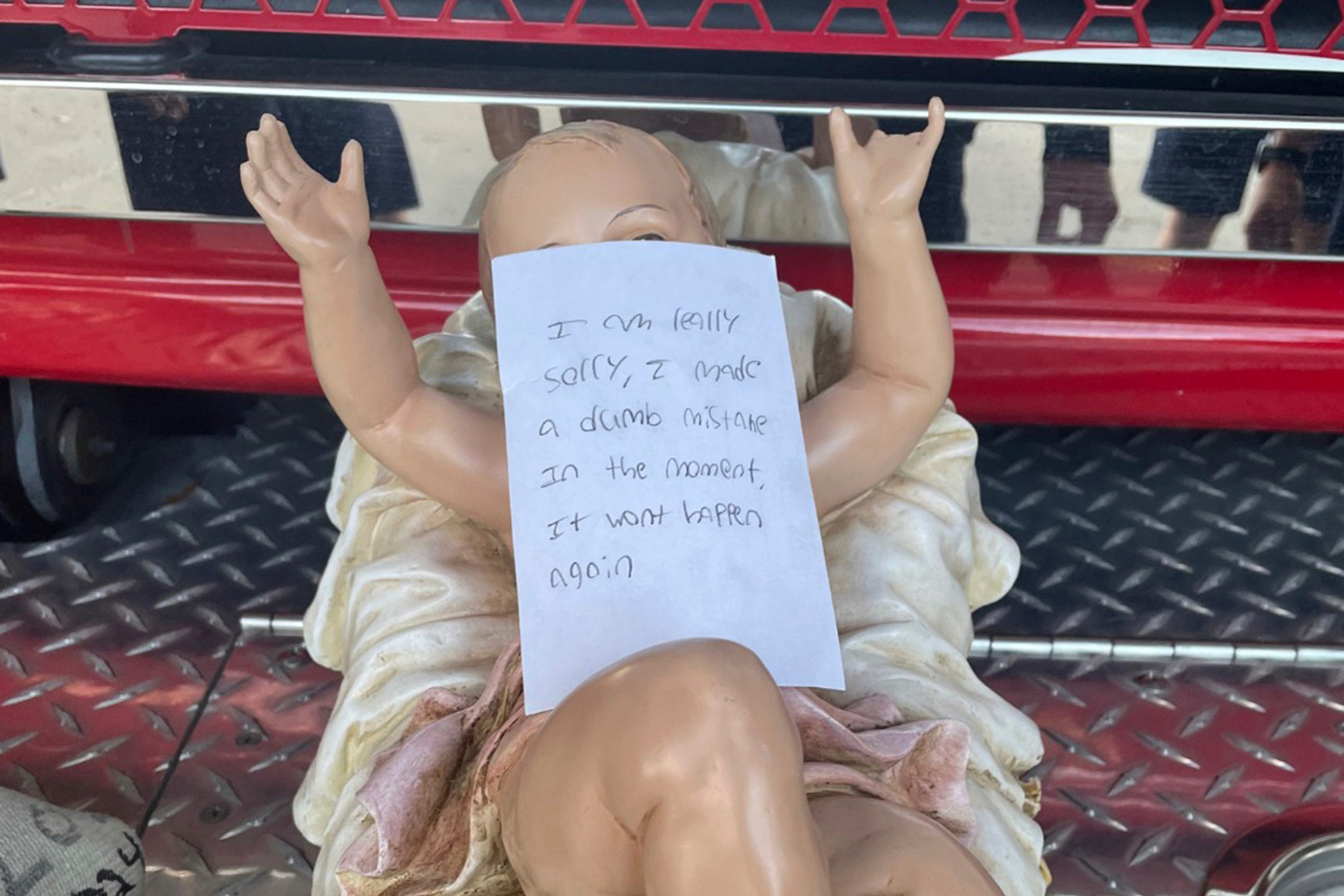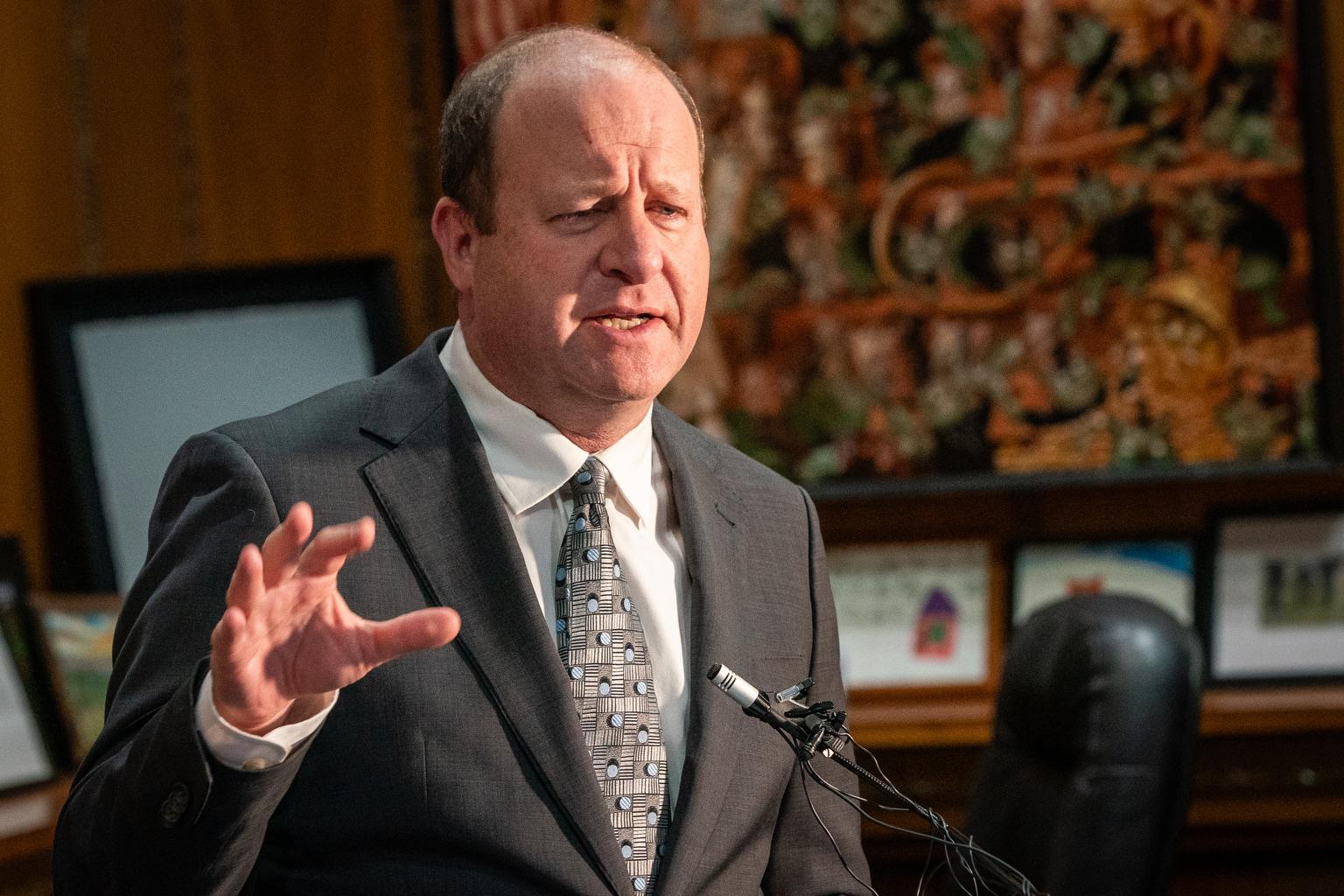
Good morning. Good morning Senator Cadman, to all of my Republican and Democratic colleagues, guests in the chamber, staff and people of Colorado. Thank you for joining us to help launch the 2014 legislative session.
(I also want to thank my partner and soul mate of 8 years for being here today and being the most supportive partner one can possibly hope for, Mike Weissman.)
Unity. The great seal of the United States carries the inscription, E Pluribis Unum. It means “out of many, one.” This motto is who we are as Americans. It is who we are as Coloradans. We are one from many. We are all individuals with different life experiences, coming from different parts of the state or country. Our diversity and differences are a source of strength, and we are here united to serve one goal -- to diligently act as public servants for the people of Colorado.
We are here to work to create good-paying jobs, so that families can pay the bills, have a roof over their head, can afford daycare, send their kids to college or trade school, and enjoy economic security in their retirement. Our job is to pave the way so that Coloradans have the freedom to succeed. I have every reason to believe we can and will work together to accomplish that end.
Education is the backbone of a healthy democracy, a vibrant economy and is essential for individual liberty to pursue their dreams, their careers, their economic security and their passions. Affordable access to a college or trade school education is critical to protect our freedom to succeed.
Education
Education has always been somewhat of a religion in my family because they all had to fight for the education they received. They saved for it. They sacrificed for it. They cherished it. It opened doors and opened minds. Their story was part of Colorado’s story and what education means to real people.
My grandfather Earl Carroll left his home in Illinois as a young man to come to Colorado to work on the railroad and as a ranch-hand in Craig, Colorado. He enlisted in the Army to serve in World War I and when he returned he wanted a college education, but couldn’t afford to go. He added jobs, and did without. He described the familiar hunger pangs in great detail, as he would go hungry to help save money so he could get a college education. Like many students today, he didn’t start college right after high school and interrupted his education during periods when he needed to work more to earn more money. He attended Colorado State University and went on to law school at the University of Colorado. His education allowed him to make a good life for himself in Alamosa, Lamar, Springfield, Ridgeway, Gunnison and Hotchkiss. During The Depression, he lost a lot, but his education allowed him to survive better than many. But because of his education, he was able to come back strong and he never forgot or took it for granted.
My mom. My mom, Rebecca Bradley, was the first person in her family to complete a college education. When she was growing up in Denver and Aurora in the 1940s and 1950s, many people, including her own father, still believed the only possible future for a woman was to marry and have children. And while that might have been a good choice for some, for her this was a terrifying proposition. She was raised in an environment where she saw her mom trapped in a relationship, financially dependent on someone who, despite his other strengths, was also a controlling, and physically abusive man. Without an education or a job, her mom was entirely financially dependent on someone who was cruel and controlling in an era where divorce was quite unthinkable.
Freedom for my mom -- was an education.
My mom’s path to independence -- was an education. But no one in her family had ever had a college education. Her father initially thought like many others at the time -- that a college education was wasted on a girl.
When my mom was 7, she and her younger brother were in the family car, stopped with a flat tire. While her father was changing the tire, he asked her brother, “what do you want to be when you grow up?” He wanted to be a big, strong trash man.
Then my mom asked, “don’t you want to know what I want to be when I grow up?”
His answer. “We’ll it doesn’t matter, you’re going to get married.”
Her answer. “I don’t want to get married. I don’t want a man to be my boss.”
His answer. “Well even if you go to work, a man will be your boss anyway.”
My mom’s answer. “No, I’ll be my own boss.”
Slap.
His response was to hit her in the face at the age of 7. She felt trapped. These life options were not OK to her.
Without any other support or role model, and in the face of active antagonism, my mom went to college at the University of Denver. She was able to go only because of financial aid and scholarships. She received her undergraduate degree in mathematics. Yet her calling was for social justice and as an advocate. She needed to find a way to help other people who lacked the power to fight for their rights. She went on to pursue a law school education at DU, also with the help of financial aid, and was one of only two women in her graduating law school class in 1966.
(I am proud to be joined today by mom and hero, Rebecca Bradley. Please help us welcome her to the Chamber).
While I too, didn’t have the money to go to college, didn’t go right after high school and had to work throughout college, the choices my parents and grandparents made to pursue higher education, opened doors for me. I worked 2 then 3 jobs after high school to save for college, but in the end I still could not have gone to college without financial aid either. I began at the Community College of Denver, transferred to CU Denver and completed my law degree at CU. This allowed me to practice law with my mother. To this date, we are still the only mother-daughter law firm I have encountered, but I hope there are many more. For my family, an education was not only a path for a career, but the path to freedom and independence, and acquiring the skills to advocate for other people and their rights. If you have been on the other side of being poor, trapped, or discriminated against, you don’t forget it, and when you make it -- you have an obligation to ensure others can do the same.
Access to college or trade and technical education changes lives. Yet, the opportunities that were there for 3 generations before me in planting roots in Colorado are now going the wrong way, moving backwards – and college is less affordable now than it was when I was in school.
- College tuition and fees have gone up more than 600% since 1985, more than gas, medical or energy inflation. This is nearly 6-times greater than the increase in general inflation during that same time.
- In 2000, the student share of tuition was 28%, and the state share was 72%. Today, in 2014, that has reversed, where the student share of tuition is now 65% and the state share is 35%.
- College textbooks have gone up 812% since 1978, more than three times the Consumer Price Index during the same period.
- Wages can’t keep up. Wages have been stagnant, and yet over the same 10-year period tuition has tripled.
- The average student debt level is now over $29,000 – almost doubling in just 8 years.
- There is nearly $1 Trillion in outstanding student debt in the United States.
And it does matter:
- 70% of new jobs in CO will require college or an advanced degree by the end of the decade.
- 5,500 good paying jobs in CO are unfilled right now due to gap in skills training.
- In 2012, the youth unemployment rate nationally was 10% higher for those with a without a college degree.
What we are talking about is squeezing out economic and life opportunities for an entire generation. This is an unsustainable trend that threatens to weaken our economy. Shouldn’t the next generation have the same or better opportunities than we did? This is about their freedom to succeed. It is about our freedom to succeed.
Our institutions of higher education are not only where economic opportunities are born but also serve as economic engines within our state, whether that be CU, Western State, Auraria, CSU, UNC, Adams State, Fort Lewis, Mines, Colorado Mesa or any of our Community Colleges or vocational, technical schools.
That is why we are introducing The College Affordability Act – Senate Bill 1.
The College Affordability Act reflects a shared priority between the Senate, the House, the Governor, and the Joint Budget Committee to put a dent in reversing this trend. Sen. Jahn, Sen. Kerr, Rep. McLachlan and Rep. Garcia are introducing this measure to add over $100 million of re-investment to higher education, increasing both need-based and merit-based financial aid, and restoring a 6% cap on tuition rate increases.
A good education is inextricably tied to a healthy economy and individual opportunities and freedoms to pursue a person’s strongest talents and desires. Educated people not only benefit from a higher employment rate and salary, but also help prompt entrepreneurship and job creation. Creating good-paying jobs that foster economic security is a priority for us all to provide the freedom to succeed.
Job Creation & Economic Security
There is some good news in Colorado’s economic health. We have out-paced most of the nation in our economic recovery, we have the 4th fastest job growth in the U.S. and that is projected to continue. Right now, CO’s current unemployment rate is 6.5%; it was 7.5% a year ago. We are moving in the right direction. Colorado has a good story to tell.
- CO 1st in U.S. for labor supply.
- We are 2nd best state to start a business.
- CO 2nd best state for entrepreneurship & innovation.
- CO 4th best state for projected economic growth in U.S.
- And we have added 161,000 jobs and are one of the few states that have surpassed our pre-recession job levels.
But our recovery is not done and there is another story about our overall economic health that is not included in these figures.
- Our Chronic, Long-Term Unemployed is still too high.
- The US and CO have had stagnate wages for decades while the cost of living climbs
- Gap between the wealthiest and poorest grows greater every year
- The loss of good paying, middle class jobs has destabilized our economy
We know that a good paying job is essential to a person’s freedom to succeed as well as the health of our overall economy, which is why I believe Colorado will see us unite in our commitment to continuing to grow good-paying jobs and pursue public policies that improve economic security.
This session you will see legislation and investment to advance:
- Rural Access to High-Speed Internet
- Workforce development
- Job Growth incentives
- IT and Hospitality Career Pathways
- Assistance for small businesses to better compete for contracts
- Expanded Investment in Advanced Industries
- Increased Investment for the Colorado Careers Act
- (Bi-Partisan) Reductions in the Business Personal Property Tax that still protect local government share.
We also know that the freedom to seek and maintain a good-paying job is in no small way impacted by the cost and availability of childcare for working moms and dads.
Child Care
- Colorado has the 5th most expensive child care in the U.S.
- The average annual cost for an infant in Colorado is over $12,000 and over $9,000 annually for a 4 year old.
- Day care is now actually higher than the average cost of in-state tuition at a Colorado 4-year college – and we all agree how expensive college tuition has become.
- This is an even bigger hurdle for women in the work force and is a major contributing factor behind the pay gap between men and women.
This is why we are:
- Enhancing Colorado’s Child Care Tax Credit; and
- Enhancing Colorado’s Childcare Assistance Program
- Continuing to explore models around the country that support employers who choose provide daycare for their workers
And as we continue to work to strengthen Colorado’s economic recovery, we must keep our focus on helping families and communities devastated by floods and wildfires in Colorado.
Floods & Fires
Colorado was hit by a once in 100 year flood in September that killed at least 8 people, damaged or destroyed 2,000 homes, washed out hundreds of miles of roads, completely cut off some communities, damaged nearly 2,000 square miles, shut down 1,900 oil & gas wells, strained wastewater systems, electrical systems, phone service, schools, and businesses.
Within an instant, heroes emerged.
- The first responders were swift, courageous and exceptional throughout the floods. They saved a 23-year-old young mother, Erin Brazzil from drowning as she was trapped in her car. Her 3-year-old daughter Autumn, still has a mother because of our first responders.
- Neighbors helped Carmen Aranda dig out of her driveway so she could transport her disabled son.
- Strangers pitched in without name, credit or recognition. The Boulder Mudslingers organized quickly to offer people power to step in where needed for people they had never met.
- Families set up the Donna Rune Fund when her driveway washed away and left her home stranded as an island.
Parents, children and siblings were separated and sometimes without the ability to communicate. Everyone impacted who survived hugged their children and loved ones a little tighter.
(We are joined by Parker and Bode Johnson and other families who victims of the recent flood. Would all here impacted by the flood please stand and let us welcome you to the Chamber.)
Significant recognition and thanks are due to our Fire Departments, Local Governments, Paramedics, Police, FEMA, and the National Guard. You saved lives often at great risk to your own. Thank you.
I also want to thank Governor Hickenlooper, CDOT and many of our state employees and others who worked around the clock to find as many ways as possible to expedite recovery and relief in our flood-impacted communities. We created the bi-partisan Flood Disaster Study Committee and early bills created include:
- Removing red tape so local communities can expedite repair of roads and bridges.
- Waiving property taxes on destroyed properties
Disasters such as these serve to remind us that the things that matter most in life are the people we love and care about.
Past Session & Civil Unions
Last session was a busy and productive session and much of what we actually worked on was eclipsed by marijuana and guns in the major headlines. While DC was criticized for doing too little, some questioned whether in CO we did too much. But 95% of all we did in CO we did with bi-partisan support and while some issues were no doubt controversial, most of the policies we pursued, and results we obtained, are supported by a strong majority of Coloradans. I want to thank you for the passage of civil unions and tell you why its passage was so important to me.
I met my friend Darin in 1997 in my first year of law school. We hit it off immediately. We bonded over the tyranny of law school and over an abidingly irreverent sense of humor. Soon after, I would meet Darin’s partner, life-mate and soul-mate David Riffle, and the three of us were fast friends.
David was diagnosed on Valentine’s Day -- February 14, 2012 -- with an aggressive form of cancer. He fought like a lion. David and Darin watched the 2012 session with great hope and interest, because after 16 years together, they wanted more than anything to enter in a civil union. While they could recognize their relationship in another state, it was important to them both that they be able to do so in their home state of Colorado. Yet civil unions did not pass that year.
David’s health took a turn for the worse and he was in and out of hospitals for chemo-therapy and related infections common for people suffering from blood cancers. Last year, with bi-partisan support, we finally passed civil unions, and it was signed into law by Governor Hickenlooper on March 21, 2013. David and Darin were planning on being there, wanted to be there, but David was in the hospital and too sick to attend. Governor Hickenlooper saved him a pen that was used in signing the Civil Unions law and that historic pen was brought to David. I wish you could have been there to see what that signing pen meant to David and Darin.
The first civil union ceremonies were scheduled to begin at midnight on May 1, 2013. But on April 26, just 5 days before, Darin lost the love of his life, to cancer. It was too late for David & Darin to enter into a civil union in Colorado. But it was not too late for others. Sometimes, as Martin Luther King indicated, justice delayed really is justice denied.
(Darin is with us here today in the chamber -- and joining him are Darin and David’s nephews, Pierson and Nathan Henry. Please join me in welcoming them to the chamber.)
I want to thank all of you for the work you did in moving Colorado closer to an equality state and to honor the freedom to love your soul-mate and the equal legal rights that go with it.
I want to thank Sen. Roberts and other Republicans for joining us in the final passage of civil unions. But that bi-partisan work and support on important bills was not the exception last session, despite the headlines, it was actually the norm.
Working Together
- CO has a proud tradition of Democrats & Republicans working together.
- Last session in CO, 95% of the bills that passed were bi-partisan.
- CO has a proud tradition of living within our means with Democrats and Republicans working together to balance our budget every year.
- When we have identified duplication, waste or inefficiencies within our state, we have worked together to better streamline time and money.
- Sen. Balmer worked with me to help enhance property rights of homeowners in HOAs.
- Sen. Baumgardner carried out the historic work with Sen. Jahn in implementing the first-of-its-kind Amendment 64.
- Sen. Brophy and Hill helped pass in-state tuition for all CO kids who are residents of CO, along with Sen. Johnston and Giron.
- Sen. Cadman helped fight for justice for families who were victims of state negligence in wildfires with Sen. Morse.
- Sen. Crowder helped expand access to Medicaid and health care in rural Colorado along with Sen. Aguilar.
- Sens. Harvey and Sheffel helped Sen. Hudak and me protect rape victims from custody battles with a rapist when the rape results in the birth of a child.
- Sen. King worked to enhance the school resource officer programs in public schools with full Democratic support.
- Sen. Lambert helped make income tax modifications for recipients of the Military Family Relief Fund, a military support program I started in 2005.
- Sen. Renfroe worked with Sen. Hudak to facilitate direct deposit income tax refunds for college savings.
So, as you can see, working together was nothing unusual last session and this session we can do even better.
Let's Defy Expectations Together
Yet public opinion of politicians, public servants or anyone in public office is at an all-time low. People are frustrated. They have come to expect the worst from us.
Our founders fought for a country that would represent the people and when elected officials are chosen through free and fair elections, government is no longer an “it” a “them” or an “other” or an “enemy”, but a “we” and an “us” and “the people”.
While we at the state level cannot fix all of the frustrations and disappointments people experience with elected officials, we can show that WE, here in Colorado, right here in this Senate chamber, are different. WE are better. They deserve to demand and expect more from us as elected leaders.
- Congressional approval is at an all-time low, with an approval rating of 9% and according to an October survey done by Public Policy Polls Congress is less popular than toe nail fungus and dog poop.
- People despise politicians. About.com describes the public sentiment about political debates as “shouting matches filled with insults and half-truths instead of forums for political candidates to express opposing points of view.”
- Perhaps most disturbingly, according to the Atlantic millenials (people born between 1982 – 2003) don’t see politics or government as a way to improve their communities, their country, or the world.
- Not surprisingly, there is even a hashtag called #politicanssuck.
Let’s defy those expectations together.
- People expect us to be self-serving, let’s instead be public-serving. We can defy those expectations by putting the needs and interests of the people, and our districts above any personal or partisan interests.
- People expect us to fight and bicker, let’s skip the shouting matches and instead problem-solve -- and in those few instances where we are unable to find agreement, let’s do so respectfully. Our friendships across the aisle here, at home, among our friends is best path to forego the scorched earth politics, and see the basic humanity in each other and in our differing communities.
- People expect us to put politics over policy, let’s instead put good public policy over politics and leave the campaigning and electioneering for after the legislative session and outside of the Capitol.
- People expect us to stall, delay and obstruct, let’s instead move at a deliberate, thoughtful pace with timely results that serve the people of Colorado.
- People expect us to put special interests over their interests, let’s become instead show through renewed outreach and listening how their ideas become our priorities. And when there are legitimate differences of opinion within our communities, let’s mediate rather than divide.
- CO has a proud tradition of Democrats & Republicans working together. I am proud of this Chamber and the people who serve in it. I believe in the power of the people to shape and impact this process. We can all open our doors a little wider, do a little more customer service for our constituents, and put a little more time in trying to best utilize the full talents and knowledge of everyone to get to better results.
- If we do our job, we can defy expectations, serve the people of Colorado, keep the welcome mat out for all Coloradans to participate, and leave this State better than we found it. If we do our job, the people of Colorado will be free to succeed, take personal responsibility and pursue their dreams and goals -- at work, school and at home.
So let’s unite and remember the motto on the great seal of the United States, E Pluribis Unum; “Out of Many, One” and make sure that we are working together to create the freedom to succeed.
Thank you for caring about Colorado.








